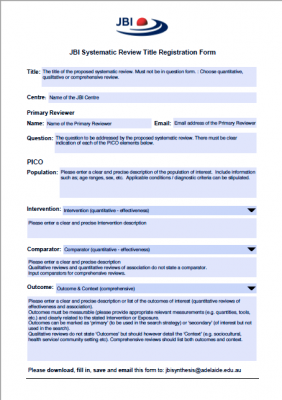
SYSTEMATIC REVIEW REGISTER
JBI has developed a collection of world-class resources driven by the needs of health professionals and consumers worldwide.
Registration of Systematic Review Titles
Please note: this register is for the use of JBI affiliated entities ONLY. Registration of a systematic review title on the JBI website is to promote collaboration between affiliated entities via highlighting current work to other JBI review authors and to recognise that the registered topic is currently in development to avoid any unintended and/or unnecessary duplication of research effort.
Registered systematic reviews that are currently underway are listed below. Protocols for these reviews may already be published or in preparation for publication within six months of initial registration. To avoid duplication, titles in this list should not be replicated by other review authors. Please contact the listed Primary Reviewer or the JBI Synthesis Science Unit if you would like further information about any of these registered reviews.
Registration of titles on this web page does not in any way constitute acceptance of the topic by JBI Evidence Synthesis.

| Title | Certified authors | Collaborating Entity or Institution | Date registered | Custom text |
|---|---|---|---|---|
| Land-based healing for global Indigenous Communities: a scoping review protocol | Brianna Poirier | JBI – The University of Adelaide | JBI – The University of Adelaide
Brianna Poirier
|
|
| Moving beyond appropriateness, awareness, and safety to cultural security: a scoping review protocol | Brianna Poirier | JBI – The University of Adelaide | Moving beyond appropriateness, awareness, and safety to cultural security: a scoping review protocol
JBI – The University of Adelaide
Brianna Poirier
|
|
| Assessment and management of fear of reinjury in people with ACL injury: a qualitative systematic review protocol | Cobie Starcevich | The Western Australian Group for Evidence Informed Healthcare Practice: a JBI Centre of Excellence | The Western Australian Group for Evidence Informed Healthcare Practice: a JBI Centre of Excellence
Cobie Starcevich
|
|
| Global standardization of clinical validation of non-invasive blood pressure devices: a scoping review protocol | Sarah Melville | The University of New Brunswick (UNB) Saint John Collaboration for Evidence-Informed Healthcare: A JBI Centre of Excellence | The University of New Brunswick (UNB) Saint John Collaboration for Evidence-Informed Healthcare: A JBI Centre of Excellence
Sarah Melville
|
|
| Exploring new graduate nurses' mental health and well-being as they transition to practice during an epidemic or pandemic: a scoping review protocol | Robin D. Burry | Memorial University School of Nursing Collaboration for Evidenced-Based Nursing and Primary Health Care: A JBI Affiliated Group | Memorial University School of Nursing Collaboration for Evidenced-Based Nursing and Primary Health Care: A JBI Affiliated Group
Robin D. Burry
|
|
| Frequency of dental visits and prevention of dental caries and periodontal disease: a scoping review | Najith Amarasena | JBI – The University of Adelaide | Frequency of dental visits and prevention of dental caries and periodontal disease: a scoping review
JBI – The University of Adelaide
Najith Amarasena
|
|
| Experiences of international labor migrants on decision making for migration: a qualitative systematic review | Suzuki Satoko | The Chiba University Centre for Evidence Based Practice: A JBI Affiliated Group | The Chiba University Centre for Evidence Based Practice: A JBI Affiliated Group
Suzuki Satoko
|
|
| Perinatal health outcomes of women on probation: a scoping review | Allison D. Crawford, PhD, RN | LLUH Center for Evidence Synthesis: A JBI Affiliated Group | LLUH Center for Evidence Synthesis: A JBI Affiliated Group
Allison D. Crawford, PhD, RN
|
|
| Moral resilience of nurses in the context of the COVID-19 pandemic: a scoping review | Jacinta Isabel Ribeiro Rodrigues | Portugal Centre for Evidence Based Practice: A JBI Centre of Excellence | Portugal Centre for Evidence Based Practice: A JBI Centre of Excellence
Jacinta Isabel Ribeiro Rodrigues
|
|
| Neurofeedback and its safety & efficacy for migraine and headache therapy: a quantitative systematic review | Dr. Marian Luctkar-Flude | Queen's Collaboration for Health Care Quality: A JBI Centre of Excellence | Queen's Collaboration for Health Care Quality: A JBI Centre of Excellence
Dr. Marian Luctkar-Flude
|